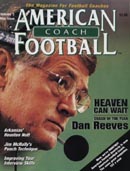AMERICAN FOOTBALL MONTHLY THE #1 RESOURCE FOR FOOTBALL COACHES
Article CategoriesAFM Magazine
|
NFL Coach of the Year: Picking Up the Trash and Raking the LeavesDan Reeves' attention to detail leads to titles.by: Richard Scott AFM Staff Writer © More from this issue It was gut check time for the Atlanta Falcons. At halftime of an NFC playoff game against San Francisco 49ers, the Falcons sat in their locker room of the Georgia Dome, reeling from a series that of odd calamities that turned a potential 21-0 halftime lead into a tenuous 14-10 edge. "The mood wasn't good. It was like, 'oh man, what's happening?'" recalled Falcons wide receiver Terance Mathis. "Then Dan came into the room." Just one month after undergoing quadruple-bypass heart surgery, Falcons head coach Dan Reeves stepped into the void and took a stand. "He really didn't have to say a word," Mathis said, "because it was all over his face. He has that cockiness that makes everybody confident around him. I'm telling you that if Dan isn't around, we don't win that game." The Falcons went on to win, and reached the Super B....The full article can only be seen by subscribers.
|
|
|||||||
| HOME |
MAGAZINE |
SUBSCRIBE | ONLINE COLUMNISTS | COACHING VIDEOS |
Copyright 2025, AmericanFootballMonthly.com
All Rights Reserved





